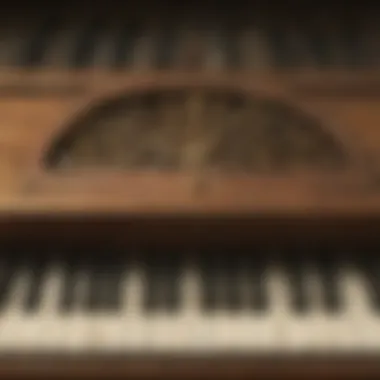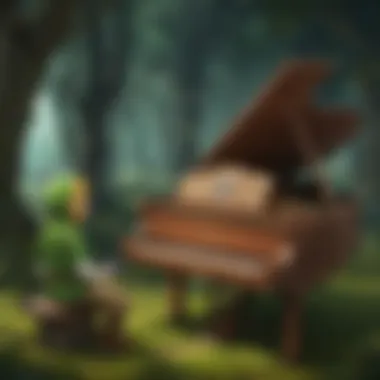Unveiling the Musical Magic: Mastering Ocarina of Time Piano Melodies


Game Reviews
Character Analyses
Lore Discussions
Gameplay Strategies
Introduction
In the realm of music and gaming enthusiasts, there exists a harmonious fusion of creativity that transcends time and space. The allure of translating the enchanting melodies of The Legend of Zelda: Ocarina of Time onto the piano keys beckons to those seeking to unlock the magic woven into each note. This comprehensive guide aims to illuminate the path for aspiring musicians, delving deep into the techniques and intricacies required to master these timeless tunes with precision and grace.
Understanding the Ocarina of Time
The significance of the Ocarina in the game
The ocarina stands as a pivotal element within the tapestry of The Legend of Zelda: Ocarina of Time, serving as a conduit between the player and the fantastical world of Hyrule. Its role extends beyond mere gameplay mechanics, encapsulating themes of courage, wisdom, and power. The versatile nature of the ocarina allows players to interact with the game environment in unique ways, fostering a deeper connection to the narrative and characters.
The musical essence of Ocarina of Time
Embedded within the heart of Ocarina of Time lies a musical landscape so rich and profound that it transcends mere background accompaniment. The melodies woven throughout the game not only enhance the player's immersion but also evoke emotions ranging from nostalgia to excitement. Each tune serves a distinct purpose, whether to unlock secret passages or invoke elemental forces, creating a symphonic journey that resonates with players long after the game has ended.
Benefits of Playing on Piano
Cognitive benefits of playing musical instruments


Engaging with musical instruments, such as the piano, offers a myriad of cognitive benefits that extend beyond the realm of entertainment. From improved memory retention to enhanced problem-solving skills, the act of playing stimulates neural pathways that promote mental acuity and creativity. Moreover, mastering musical pieces cultivates discipline and perseverance, nurturing a holistic approach to personal growth.
Connecting with the game through music
By transposing the iconic melodies of Ocarina of Time onto the piano keys, players forge a profound link with the game world, transcending the digital realm into a tangible, auditory experience. The act of recreating these melodies not only honours the game's legacy but also allows musicians to infuse their interpretations with personal expression, breathing new life into familiar tunes. This connection fosters a deeper appreciation for the game's narrative, characters, and overarching themes, offering enthusiasts a unique avenue for exploration and creativity.
Getting Started
Embarking on the journey of mastering *
Mastering the Key Melodies
Mastering the Key Melodies in this insightful article plays a crucial role in imparting a comprehensive understanding of playing Ocarina of Time on the piano. It delves deep into the essence of the game's musical intricacies, providing aspiring musicians with the necessary tools to excel in capturing the essence of the iconic melodies. By focusing on specific elements such as note transitions, hand coordination, and expression, mastering key melodies equips players with the skills to accurately interpret and portray the musical soul of Ocarina of Time.
Learning Zelda's Lullaby
Breakdown of the notes and fingering
Understanding the breakdown of notes and fingering within Learning Zelda's Lullaby is pivotal to honing precision and accuracy in piano performance. By dissecting each note's significance and mastering the fingering techniques required, musicians can enhance their ability to beautifully interpret this beloved melody from Ocarina of Time. The meticulous breakdown allows for a nuanced exploration of tempo variations and dynamics, empowering players to infuse their unique touch while staying true to the essence of the original composition.
Tips for adding emotional depth
Incorporating emotional depth into the rendition of Zelda's Lullaby elevates the musical experience and fosters a profound connection with the listeners. By implementing expressive techniques like dynamics variation, phrasing nuances, and subtle rubato, players can evoke a range of emotions and transport the audience into the enchanting world of the game. These tips not only add layers of complexity to the performance but also encourage musicians to explore their artistic interpretation, forging a deep emotional resonance with the audience.
Playing the Song of Time


Technical challenges and practice strategies
Navigating the technical challenges embedded within the Song of Time is essential for pianists seeking mastery and fluency in their performance. By honing specific practice strategies tailored to address complex passages, hand coordination, and tempo variations, musicians can overcome hurdles and enhance their overall proficiency. Understanding the technical nuances of this composition empowers players to execute the piece with finesse, precision, and a seamless flow, effectively capturing the essence of the Song of Time.
Interpreting the tempo and dynamics
Interpreting the tempo and dynamics of the Song of Time is a critical aspect of conveying the piece's inherent emotion and intensity. By carefully analyzing tempo markings, dynamic contrasts, and rhythmic patterns, musicians can imbue the composition with a sense of urgency, nostalgia, or serenity, as intended by the original piece. This depth of interpretation not only enriches the musical narrative but also allows players to showcase their musical sensitivity and understanding of the stylistic nuances present in this iconic melody from Ocarina of Time.
Exploring Advanced Techniques
In the realm of musical mastery, delving into advanced techniques is a pivotal journey. The section focusing on Exploring Advanced Techniques within the context of playing Ocarina of Time on the piano serves as a gateway to elevating one's musical proficiency to a nuanced level. The significance of this topic lies in the intricate layers it adds to the player's skill set, allowing for a deeper understanding of musical complexity and expression. By exploring advanced techniques, aspiring musicians can expand their repertoire, enhance their musical dexterity, and infuse unparalleled richness into their performances.
Utilizing Arpeggios and Trills
Incorporating decorative elements into your playing
Within the realm of piano performance, incorporating decorative elements like arpeggios and trills embodies a distinct artistry that embellishes musical renditions. The key characteristic of integrating arpeggios and trills lies in the ability to add embellishments and ornamentations, elevating the overall musical narrative and adding a touch of sophistication to the performance. This approach not only enhances the aesthetic appeal of the music but also showcases the player's technical prowess and attention to detail. The unique feature of incorporating arpeggios and trills is their capacity to evoke emotions and create dynamic variation within the music, serving as a powerful tool for musical expression. While these decorative elements enrich the musical experience, careful moderation is essential to maintain a delicate balance and prevent overshadowing the main melody.
Enhancing musical expression
Enhancing musical expression through varied nuances and emotive delivery is a cornerstone of artistic interpretation. In the context of playing Ocarina of Time on the piano, this aspect contributes significantly to conveying the mood, atmosphere, and narrative essence of the game's iconic melodies. The key characteristic of enhancing musical expression lies in the player's ability to imbue each note with personal sentiment and interpretative depth, transforming mere notes into a compelling musical story. This approach not only enriches the listener's auditory experience but also establishes a profound connection between the performer and the audience, transcending mere technical proficiency. The unique feature of enhancing musical expression is its capacity to evoke nostalgia, invoke powerful imagery, and evoke a sense of profound emotion, making the music resonate on a profound emotional level. While this artistic endeavor enhances the musicality of the performance, maintaining authenticity and avoiding excessive sentimentality is essential to strike a harmonious balance in musical interpretation.
Perfecting Your Performance
Perfecting Your Performance is a crucial aspect of mastering the timeless melodies of The Legend of Zelda: Ocarina of Time on the piano. As aspiring musicians delve into the enchanting world of Ocarina of Time, honing their skills through diligent practice and attention to detail becomes imperative. Achieving mastery in playing these iconic tunes not only showcases dedication but also enhances one's musical abilities. By focusing on precision, expression, and consistency, musicians can elevate their performances to truly captivate audiences and resonate with the essence of the game.


Embracing Interpretation and Artistry
Infusing your unique style into the music
Infusing your unique style into the music offers aspiring pianists the opportunity to showcase their individual creativity and musicality. By adding personal touches to interpretations of Ocarina of Time's melodies, musicians can breathe new life into these timeless tunes. This aspect of musical expression allows for a deeper connection with the music, enabling performers to evoke emotions and engage listeners on a more profound level. While infusing unique styles can enhance the overall musical experience, it is essential to strike a balance between originality and respecting the composition's integrity.
Emotional connection with the melodies
Establishing an emotional connection with the melodies of Ocarina of Time is paramount in delivering authentic and moving performances. By immersing oneself in the narrative and themes of the game, musicians can imbue their playing with sincerity and depth. Connecting emotionally with the melodies not only enriches the musical experience but also allows performers to convey the intended sentiments behind each composition effectively. This emotional resonance creates a profound impact on both the performer and the audience, enhancing the overall musical journey.
Seeking Feedback and Improvement
Engaging with fellow musicians for constructive criticism
Engaging with fellow musicians for constructive criticism provides valuable insights and perspectives to enhance one's musical proficiency. Collaborating with peers allows for the exchange of feedback, ideas, and techniques, fostering growth and development as a pianist. Constructive criticism offers constructive guidance for refining skills, interpreting music, and overcoming challenges, ultimately refining one's craft. By embracing feedback from a supportive community, musicians can continuously improve and strive for excellence in their piano performances.
Continuous refinement of your piano skills
Continuous refinement of piano skills is a continuous journey towards musical excellence. Through consistent practice, exploration of new techniques, and dedication to improvement, musicians can elevate their playing to new heights. This commitment to honing skills ensures that performers maintain high standards of performance quality, interpretative depth, and technical proficiency. By embracing a mindset of continuous growth and refinement, pianists can unlock their full potential and deliver captivating renditions of Ocarina of Time's iconic melodies.
Conclusion
In concluding this intricate guide on playing Ocarina of Time on the piano, we unearth a profound understanding of the amalgamation of music and gaming. Through this article, we have dissected the essence of each melody, unraveling the symbiotic relationship between the player, the instrument, and the game. The importance of this Conclusion lies in its ability to solidify the bond forged between gamers and musicians. By delving into the melodies, reflecting on the challenges overcome, and embracing the artistry of the compositions, one not only enhances their musical prowess but also deepens their connection with the mythical world of Zelda. This final section acts as a gateway for aspiring musicians to transition from mere players to true musical heroes who can evoke emotions, tell stories, and inspire through their piano performances.
Becoming a Musical Hero
Reflecting on your musical journey with Ocarina of Time
Embarking on a journey through the melodic landscapes of Ocarina of Time is akin to navigating a labyrinth of emotions and technical intricacies. Reflecting on your musical progress not only allows for introspection but also serves as a compass guiding you through the nuanced nuances of each composition. The act of reflecting on your musical journey with Ocarina of Time encapsulates not just the notes played but the growth experienced. It remains a crucial element in this guide as it urges players to pause, ponder, and absorb the lessons hidden within each melody. By delving into the complexities of the pieces, analyzing personal improvements, and internalizing the passion instilled by the game, one can truly embody the spirit of musical heroism.
Inspiring others through your piano performances
Elevating your piano performances beyond mere renditions to transformative experiences requires not just technical proficiency but also the ability to evoke emotions and inspire others. Inspiring through piano performances is an art form in itself, a conduit through which musicians can connect with audiences on a deep, visceral level. The key characteristic of inspiring others through your piano performances lies in the transformative power of music to transcend barriers, evoke memories, and stir souls. This aspect is not just beneficial but also essential in this guide as it encourages players to embrace the role of a musical storyteller. By weaving narratives through melodies, captivating listeners through expressive playing, and sharing the magic of Ocarina of Time through each note, one can leave a lasting impact on both players and listeners alike.







